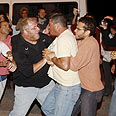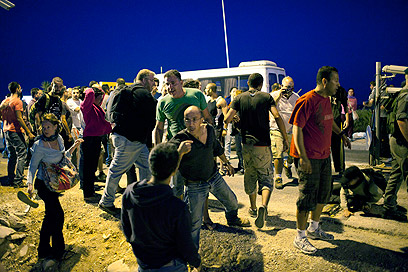
Clash in Anatot
צילום: AFP
Lynch the leftists
Op-ed: Almost unnoticed lynching of leftist activists this week should alarm every Israeli
So what happened around here this past week? Tnuva’s chairwoman quit, Merkel was insulted, the Quartet is nagging, and, oh yeah, some leftists were beaten up. No big deal. How easy it is to get used to it. And how much they help us get used to it.
“There are some guys who wish to come here and kick your ass,” “you dogs,” “you whores are sleeping with Arabs, “all the residents will come here,” “there will be death here.” What does it sound like? An angry mob marching with raised fists and yelling, with blazing eyes, “death to the Arabs.” A stone is hurled, a spike (knife?) is pulled out, people are lying on the road, bleeding; broken noses, shattered windows. What does it look like?
Related stories:
Friday evening, at the end of Rosh Hashana, a lynching was carried out outside the settlement of Anatot. No less. View the videos online and see for yourselves. Fortunately, the incident ended with only 26 people wounded and several razed cars, with no fatalities. However, those exposed to the story via the media heard at most about “clashes” between leftist activists and settlers. Three people were held by police for questioning – leftists, of course.
What characterizes cultures where lynching has become a permanent means of “punishment”, ranging from South Africa in the 1970s and 1980s to current-day Afghanistan, is not the level of public violence or the police’s helplessness – these can be found in restrained states as well – but first and foremost the public legitimacy.
There are different ways to produce legitimacy: The leadership’s silence is one way. Creating symmetry and “balance” in the media between the assailants and victims – one narrative against another – is another way. However, the simplest way to produce legitimacy is to turn such events into no more than “curious incidents.”
Imagine settlers were attacked
Imagine that the exact same conduct, with no change, would have been directed at the settlers. The whole country would rage; we’d see a quick, efficient investigation; hundreds of detainees (Palestinians, of course); a curfew, reports from the site, firm responses by the prime minister and his ministers.Did anyone hear some kind of condemnation from the government this time around? It would be ridiculous to even suggest it. What happened after all? A few leftists were beaten up.
It’s hard to think of another group whose death had been sanctioned to such extent, with such grave, open violence against it, perpetrated by an angry mob in plain view of the cameras and police, passing so quietly - almost with a yawn. No other Jewish group, that is.

'Mini-pogroms' at least once a weak (Photo: Activestills)
Palestinians in the territories face such “mini-pogroms” at least once a week: Shepherds in the south Mount Hebron area are repeatedly beaten up, Nablus-area farmers whose fields are burned, and residents of Hebron’s H2 area whose windows are all broken as result of the Jewish community’s stones. And so on and so forth. There is no difficulty in seeing it, and much of it had been captured on film. Everything is recorded. Yet who cares.
The Talmud says that those who spill the blood of a gentile will end up spilling the blood of Jews. At first glance, this is an outrageous text, as it turns the killing of a gentile into a problem only because of its indirect results for Jews. However, there may be a much deeper insight here: Those who sanction the death of gentiles could soon find themselves doing the same to Jews.
The limitations we imagine, as if it’s possible to forego the honor, property and in many cases lives of the Palestinians in the territories without this trickling, in are no more than an illusion. Those who sanctioned the death of the Palestinian yesterday are sanctioning the death of the “radical” Left today. And what will happen tomorrow?
And so, with no interruption, a lynching culture is emerging in the State of Israel. Those who monitor the deterioration of Israel democracy with anxiety would do well to mark Rosh Hashana this year as the day where the lynching of leftist activists ceased to be an outrage and turned into a curious story.
Professor Yishai Rosen-Zvi is the head of Talmud and Ancient Literature studies at Tel Aviv University’s Hebrew Culture Department
- Follow Ynetnews on Facebook










